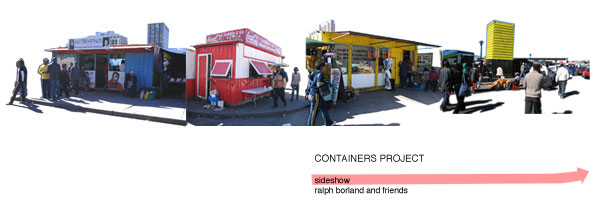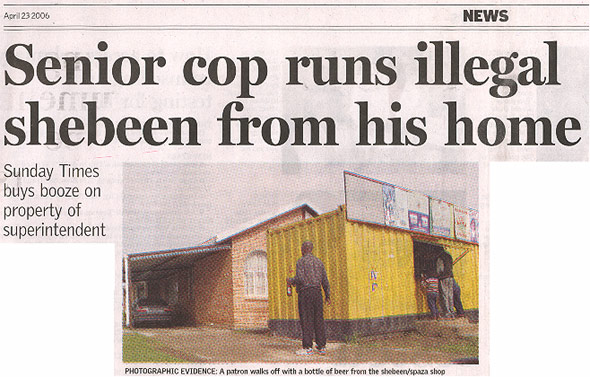| RalphBorland.net |
| Sideshow p. 1 2 3 4 5 6 |
| Background
|

|
| There is an existing 'language' around the repurposing of
shipping containers in Cape Town. The photographs above (from my proposal
to Next Wave) are all from the top of Cape Town station, around the minibus
terminus, and show containers modified
for use as hair-salons, take-away food joints, and cell-phone repair shops.
I borrowed some of this language for Sideshow, opening up the side
of my container, and forming a social area around it with furniture made
from plastic crates - for a 'global shebeen' vibe. A shebeen is an illegal
drinking establishment, a 'speakeasy'.
Soon after I returned to South Africa
from Melbourne, I spotted an article in a local newspaper about another
South African who turned a shipping container into a shebeen...
|
 |
| 'Senior cop runs illegal shebeen from his home' Sunday Times, 23 April 2006, p.5 During the apartheid era, government beerhalls in the black townships were boycotted or burnt down, and backyard shebeens flourished. The mythology around them is of a place for clandestine liasons, where politics and the issues of the day where discussed. The shebeen is still a South African icon, and I wanted to play on the romantic idea of it as a 'speakeasy', where people from around the world could meet each other and talk about politics and plans for insurrection.
As inspiration, I showed projects that demonstrate tactics for subversion and provocation or embody sites of socio-political conflict, from tools for activists, to art works that engage the media or the law courts - objects and techniques for getting ideas out in innovative ways - to devices for connecting people to energy or communication networks. Some of the words and terms that informed Sideshow are reproduced below. |

|
| Please go to the next page for more about the ideas and work that informed Sideshow.
|